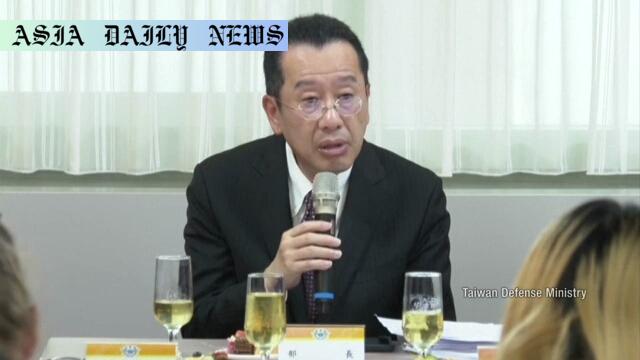Taiwan significance: Defense Minister Koo highlights importance of Taiwan-US ties, status quo across Taiwan Strait.
Taiwan remains a key player in the Indo-Pacific strategy.
US-Taiwan alignment prioritizes the status quo across the Taiwan Strait.
Koo reassures on continuing US involvement under Trump’s administration.

Introduction: Taiwan’s Strategic Significance
Taiwan continues to remain at the heart of a prominent geopolitical tug-of-war largely due to its strategic location, thriving democracy, and unique historical and political relationship with China. Recently, Taiwan’s Defense Minister, Wellington Koo, underscored the significance of maintaining robust ties between Taiwan and the US. Speaking to major media outlets, including NHK, Koo expressed confidence that the United States, led by then-President Donald Trump, would remain actively engaged in the region.
The Importance of US Involvement
Koo elaborated on the importance of US interests in the Indo-Pacific as a priority for both Taiwan and the global community. He emphasized America’s strategic imperative to remain actively involved in the region, describing it as a core interest essential for balancing power in a politically and militarily tense area. Taiwan has long benefited from its alignment with the United States, a relationship based on shared values and practical geopolitical considerations.
Reassurance Amid Policy Uncertainty
One of the key themes of Koo’s remarks was reassurance, aimed at dispelling concerns about the influence of Trump’s ‘America First’ policy on Taiwan-US relations. There have been growing concerns within Taiwanese society that a shift in American foreign policy priorities could lead to diminished US support for Taiwan, especially amid rising threats from China. Koo drew attention to the longstanding consensus to maintain the status quo across the Taiwan Strait, which serves as the foundational principle of Taiwan-US collaboration.
Understanding the Taiwan Strait Impasse
The Taiwan Strait has historically been a flashpoint of tension and conflict, representing a stark divide between democratic Taiwan and the authoritarian regime in mainland China. Over the years, Taiwan has faced threats of military aggression and diplomatic isolation, yet it has emerged as an indispensable partner for countries interested in securing free trade, access to energy routes, and freedom of navigation. Koo’s comments underscored the necessity of collective action to ensure that peace, stability, and status quo remain unchallenged in the strait.
The Role of Trump Administration
Despite President Trump’s often-controversial approach to international diplomacy, Taiwan and the US have found areas of convergence, particularly in terms of countering China’s aggression. Koo’s optimistic outlook suggests a broader understanding of shared benefits, recognizing that Taiwan’s alignment with the United States is not only a matter of ideology but also one of strategic significance. By highlighting America’s continued engagement with Taiwan, Koo sends an important message to both domestic and international audiences.
Conclusion: A Shared Future of Cooperation
In conclusion, Koo’s remarks resonate deeply within the context of Taiwan’s geopolitical struggles and aspirations. They affirm the necessity for sustained dialogue and strategic alignment with global powers, especially the United States, to deter threats and maintain peace in the Indo-Pacific region. Taiwan’s leadership continues to navigate complex terrain with tact and optimism, balancing the principles of sovereignty, democracy, and global cooperation.
Commentary
Analyzing Taiwan’s Geopolitical Landscape
Taiwan stands as a testament to resilience and diplomatic tact in an increasingly polarized global landscape. The remarks made by Defense Minister Wellington Koo underscore not only the importance of stable Taiwan-US relations but also the island’s strategic nerve center status in the Indo-Pacific. Considering China’s aggressive posturing and its goals of reunification, it is crucial to address why Taiwan remains an indispensable partner for the United States. The message that Koo offers isn’t just about diplomacy—it is about survival and the importance of deterrence through cooperation.
Understanding US-Taiwan Relations Under Trump
The Trump administration’s approach to Taiwan reflected a somewhat balanced stance. While ‘America First’ policies have often prompted skepticism among US allies, Taiwan benefited from growing bipartisan recognition of its importance—both as a symbol of democracy and a key player in countering China’s influence. President Trump’s willingness to engage with Taiwan, highlighted by actions such as arms sales and diplomatic overtures, provided a layer of assurance to Taipei during uncertain times. Koo’s comments about maintaining the status quo in the Taiwan Strait highlight a shared understanding, which is vital for peace in the region.
Taiwan as a Beacon of Stability
At its core, Taiwan’s significance transcends its geographic location or economic clout. It represents a foothold for democratic values in a region increasingly dominated by authoritarian regimes. By investing in its defense, engaging in international forums, and reinforcing its partnership with allies, Taiwan continues to chart a path that prioritizes stability for itself and the region at large. Perspectives like Koo’s remind the global community that cooperation and consistency are integral to addressing 21st-century challenges, such as China’s assertiveness and rapid military expansion.


